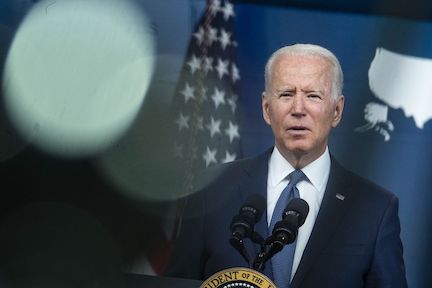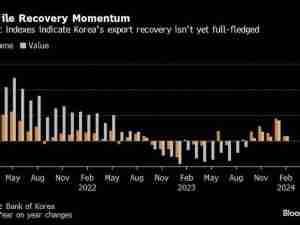President Joe Biden’s pledge to refrain from pursuing new trade deals is leaving a key training and assistance program for workers, who the administration says are at the center of its agenda, without a clear path for renewal.
Biden on July 1 officially lost Trade Promotion Authority, or TPA—the fast-track deal-making ability Congress delegates to a president—after he didn’t ask for its renewal. That power, granted under the Trade Act of 1974, was typically renewed when Biden’s predecessors wanted to pursue specific free-trade agreements.

The administration says that it first wants to make investments at home and review progress of talks with the U.K. and Kenya inherited from Donald Trump to make sure that potential deals are consistent Biden’s pledge to prioritize workers.
But TPA expiration coincided with the end of enhanced Trade Adjustment Assistance, or TAA—a program renewed along with the fast-track authority six years ago. TAA provides aid for Americans who lose their jobs or whose hours and wages are cut due to competition from imports. An estimated 48,000 workers, primarily in service industries, will lose eligibility for benefits over the next year, according to the Department of Labor.
TPA Connection
The trade aid typically has been used as a bargaining chip to win support for TPA or for trade deals themselves. In the past, some Democrats who worried about the competition U.S. industries would face under free-trade deals could be persuaded to approve them if workers received extra support. Likewise, Republicans who backed a trade liberalizing agenda but opposed more spending could be convinced to accept the aid program.
The administration’s decision to let TPA expire without a renewal request shows the low appetite in Congress for pursuing new trade deals, said Rufus Yerxa, a former senior U.S. trade official.
In the past, “you could pull together a bipartisan group to support the trade agreements,” said Yerxa, who now leads the National Foreign Trade Council. “You kind of tried to minimize the opposition from labor Democrats and others by including TAA, but all of that is ancient history now because none of that coalition works at all.”
The trade aid was last renewed in 2015, when Barack Obama requested the fast-track authority to negotiate the Trans-Pacific Partnership, and some Democrats demanded the assistance as the price for their support. Trump withdrew the U.S. from the TPP in his first week in office and called it a “terrible” deal.
The Senate last month passed a standalone 23-day extension of TAA, but the House failed to act on it before leaving for its Independence Day break. While some have argued that there’s less urgency to renew the trade assistance because Congress expanded unemployment insurance for all workers during the pandemic, Republican governors in about half of all states already terminated that aid before it expires nationwide Sept. 6.
Biden “has strongly endorsed rapid passage” of TAA reauthorization through Congress, a White House official said, adding that there are a number of potential pathways forward to do so quickly.
“We will only pursue new trade deals after we have made investments in American workers and communities,” the official said. “Signing new trade deals is not the only metric of a successful trade policy. We are continuously pursuing inclusive, worker-centered trade policies that reinforce the United States’ resiliency, recovery, sustainability, and competitiveness.”
In order to receive trade-related aid, workers must apply and prove that they’re hurt by foreign competition. Since Congress didn’t act to extend TAA before a July 1 deadline, it reverted to a dramatically curtailed version. Under the program’s new restrictions—which don’t apply to workers who were already receiving benefits—new applications from workers in service industries can no longer be approved.
Scaled Back
Manufacturing workers can still receive support, but case-management services that help them access job training and find reemployment will no longer receive federal funds. Wage supplements that applicants aged 50 and older previously could earn when they found new work in a lower-paying job also ended.
Service-sector workers, employed in industries such as hospitality, utilities and warehousing, accounted for more than half of TAA petitions received by the Department of Labor, the agency said in a July 1 guidance document, without stipulating the time period. Now their applications will be denied, pending the passage of new TAA legislation.
“The service sector was hardest hit by the Covid pandemic, and employs high numbers of women, people of color, and older, high tenured American workers,” Labor said.
Excluded workers eventually could have their benefits renewed retroactively, as they were in 2015 after an expanded version of TAA expired at the start of 2014.
House Ways and Means Committee Chairman Richard Neal, a Democrat from Massachusetts, and Representative Earl Blumenauer, an Oregon Democrat who chairs the trade subcommittee, blamed lack of engagement from Republicans for the program lapse.
“While our country continues to deal with the reverberating effects of the pandemic, this reversion will also disproportionately harm women and minority workers, and will prevent workers affected by trade from China from accessing the program,” they said. “House Democrats are looking for the earliest opportunity to put the program back on track, and will also seek to increase and modernize TAA’s benefits.”







